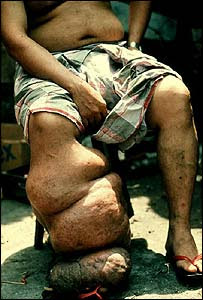
Dengue Fever
Dengue fever is an illness caused by the dengue virus, which is carried and spread by the Aedes mosquitoes. These viruses cause the body to bleed easily and may affect other organ systems.
The usual symptoms experienced are:
- Fever
- Headache
- Muscle and joint aches
- Rash - different types of rash, may be itchy and appears a few days after the onset of fever
- Bleeding tendency - from nose, gums, and other parts of the body due to low platelets; platelets are one of the blood components, which help to clot and prevent excessive bleeding. Normal platelets levels are 150,000 - 450,000 per ml.
- Bruises from minor knocks and bumps

Sometimes, dengue infection can present in the more serious form, known as Dengue Hemorrhagic Fever (DHF) or Dengue Shock Syndrome (DSS), whereby serious complications can occur, resulting in:
- Widespread bleeding
- Low blood pressure / shock due to bleeding or leaking blood vessels
- Organ failure
- The risk of dying from dengue complications is very low; less than 1-5% if supportive treatment is given early.
Fluid / Water Replacement
- Children about 1 year old or > 10 kg, should drink at least 1 litre of fluids a day
- Children > 40 kg or adult, should drink at least 2 litres of fluids a day
This is because
- Fever increases water loss from body
- Dengue fever causes the blood vessels to be leaky and increases water loss from the blood circulation

Symptom Relief and Fever Control
- Painkillers (e.g. paracetamol) may be given to relieve pain and control fever
- Avoid aspirin (or other medications such as ibuprofen and diclofenac suppositories that affect the platelet functions)
- Medications may be given for nausea and vomiting
Can You Or Your Child Be Infected Again?
Yes. There are 4 strains of dengue viruses. Infection with one strain will provide protection against only that particular strain. Future infection by other strains is possible. Currently there is no vaccine available for dengue fever.
How To Reduce The Chances Of Being Infected By Dengue Fever?
Singapore is in the tropical region where Aedes aegypti mosquitoes live. The best prevention is to get rid of mosquito breeding places:
- Change water in vases/ bowls (including pet water containers) on alternate days
- Remove water from flowerpot plates on alternate days
- Turn over all water storage containers
- Cover bamboo pole holders when not in use
- Cover rarely used gully traps
- Add prescribed amount of Temephos sand granular insecticide in roof gutters at least once a month
- Cover toilet bowls and floor traps when away from home for a few or more days
- Fit all floor traps with anti-mosquito valves
Air conditioning or windows/ doors with mosquito screens can reduce the risk of being bitten by mosquitoes.
Using mosquito repellents containing DEET as the active ingredient on exposed skin and clothing can also decrease the risk of being bitten by mosquitoes.
However, it is important to note:
- Children below 2 years old should avoid DEET mosquito repellent
- Children below 3 years old should avoid eucalyptus oil
- Children above 2 years old should use mosquito repellent in lower concentration of DEET between 7 - 20%
- Pregnant women should reduce the usage of DEET mosquito repellent and apply on clothing instead
- Mosquito repellent with DEET in concentration between 20 - 30 % is only suitable for adult
Worms
People affected by Lymphatic Filariasis (LF) often cannot work or marry, and can be shunned by others in their village because of their disfigurement.
It is caused by parasitic worms invading the body's lymphatic system - the network of vessels carrying infection-fighting cells.
The worm is spread by mosquitoes, who pass it on when they take blood from humans.
The bacteria-containing worms lodge in the lymphatic system, producing millions of minute larvae which spread throughout the bloodstream.
It is unclear whether the swelling, or lymphoedema, that occurs results from the obstruction of the lymphatic vessels or from the response of the body's immune system to the worms and the bacteria within them.
Secondary bacterial infections, resulting from long-term damage of lymphatic vessels caused by the adult worms, could also play a role.
Existing LF treatments kill the worm larvae to prevent transmission. But they have little or no effect on the adults worms.
Nor do they halt the progression of the symptoms once the disease has developed.
Discover t.A.T.u.!



